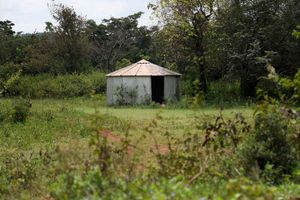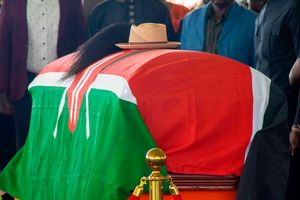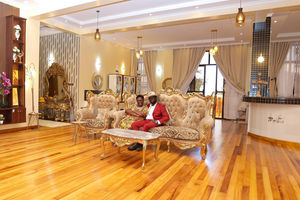
Deputy President William Ruto. He remains the star of the ongoing trial of Kenyan lawyer Paul Gicheru.
| Cheboite Kigen | Nation Media GroupPolitics
Premium
ICC headache for Ruto as lawyer Paul Gicheru trial begins
Deputy President William Ruto might be several thousands of kilometres away and almost six years since his case at the International Criminal Court in The Hague collapsed, but he remains the star of the ongoing trial of Kenyan lawyer Paul Gicheru.
As the trial of Mr Gicheru started in The Hague on Tuesday, several references were made of how a coordinated witness interference scheme was hatched to “save” the Deputy President from the crimes against humanity charges he was facing. According to the prosecution, the cases then spectacularly collapsed due to bribery and intimidation of witnesses.
According to the ICC Deputy Prosecutor James Stewart, at least four key prosecution witnesses who were set to give incriminating evidence on the role the DP allegedly played in the planning of the 2007/8 post-election violence either recanted their testimonies or refused any further cooperation with the Office of the Prosecutor.
Offered a bribe
This is after they were offered a bribe or intimidated by members of “the Common Plan” of which Mr Gicheru was allegedly a part, while Dr Ruto was reportedly at its apex.
“Your honour, the investigation and prosecution of William Samoei Ruto and Joshua arap Sang were beset from the outset with witness interference and intimidation problems, which continued up to and throughout the trial,” said Mr Stewart in his opening statement as Mr Gicheru’s trial started before ICC Judge Miatta Maria Samba.
“The most egregious and damaging instance of such witness interference with the accused Paul Gicheru allegedly at its centre commenced in early 2013 and continued throughout the trial,” he added.
The deputy prosecutor is leading the case after Prosecutor Karim Khan recused himself because of the potential of conflict of interest, having been Dr Ruto’s defence lawyer at trial.
Witness tampering
According to Mr Stewart, the Office of the Prosecutor (OTP) started an investigation parallel with the Ruto and radio journalist Joshua Sang trial amid numerous reports of witness tampering.
“That investigation allowed the prosecution to uncover and document the commission of the offences that formed the basis of the case that is now before this chamber,” he said.
In the prosecution’s trial brief as well as the document containing charges, the DP was at the apex of the alleged Common Plan whose mission was to identify, locate and compromise witnesses through bribes or intimidation so that they do not testify against Dr Ruto and Mr Sang.
“The prosecution brings this case against Paul Gicheru to protect the integrity of the court’s proceedings from offences against the administration of justice to punish those responsible and deter future offenders,” said Mr Stewart.
Embarrassing disclosures
While there remains an extremely remote chance that the Gicheru trial could generate new evidence to revive the Ruto case, some of the disclosures will, however, be embarrassing to the DP and could potentially provide fodder to his political rivals as campaigns hot up ahead of the August 9 elections.
Dr Ruto’s ally, former Devolution Cabinet Secretary Charles Keter, has, however, said it won’t matter how many times the DP is mentioned in the Gicheru trial.
“We will wait and see, but I do not think that makes the DP worry. He is much at peace. When you know that in the first case you were innocent, that clears your conscience,” said Mr Keter.
Mr Ruto’s case at the ICC was dropped due to lack of sufficient evidence, with the prosecution free to revive the case if they can obtain new evidence.
Earlier as the trial started, Mr Gicheru pleaded not guilty to the numerous charges facing him for his alleged role in compromising witnesses that were to testify against Dr Ruto.
This happened as the prosecution laid out the case they have against Mr Gicheru in an opening statement, whose actions allegedly led to the withdrawal and recanting of statements of at least four key prosecution witnesses in the Ruto and Sang case.
Take a plea
After the court officer read all the confirmed charges to him, Judge Samba asked Mr Gicheru to stand up and take a plea.
Judge Samba: Do you understand the nature of the charges read out to you today?
Mr Gicheru: Yes, I do madam judge.
Judge Samba: Do you make an admission of guilt to any of the charges?
Mr Gicheru: Not at all. Madam President, for the record I plead not guilty.
Judge Samba: In respect of all the charges?
Mr Gicheru: Yes
Judge Samba: Thank you very much. You may be seated.
Though he surrendered to the court voluntarily on November 2, 2020, five years after an arrest warrant was issued by the ICC, Mr Gicheru has often denied the charges against him of offences against the administration of justice in the crimes against humanity charges against Dr Ruto and journalist Joshua Sang.
Before taking his plea, Mr Gicheru’s lawyer Michael Karnavas had confirmed having properly advised the accused on his rights.
“We have explained all his rights and he intends to go ahead with the trial,” said Mr Karnavas.
The first day of the trial also saw the prosecution present its first witness, P-0800, who was accorded in-court protective measures such as face and voice distortion, use of a pseudonym and use of private sessions to enable him to discuss confidential and possibly identifying information.
Beyond that, P-0800 was given an assurance that he would not be prosecuted if he self-incriminates during his testimony. This had been a contentious issue that saw the ICC registry assign the witness a legal adviser, Ms Vessela Terzieva. Another witness lined up to testify, P-0341, has also been assigned a legal adviser, Mr Hédi Aouini, for the reasons of self-incrimination.
Record calls
While being led in his evidence-in-chief by the senior trial lawyer Anton Steynberg, the witness who was to testify against Dr Ruto before he recanted his testimony, allegedly after being bribed, disclosed that after he was first contacted by people who were reportedly working for the DP, he informed ICC investigators who advised him to record subsequent calls, which he shared with the OTP.
According to the witness, he was not coerced to make and hand over the recordings.
“I did it because I did not accept to see victims of the post-election violence go without justice because of bribery and intimidation,” the witness said.
He added that he continued recording the conversations and prodding his callers further because he wanted to find out who was sending them and what the callers were offering in exchange for his testimony.
Mr Gicheru’s defence has in past filings sought to portray the witnesses as flip-floppers who lack any credibility given their behaviour during the Ruto and Sang trial.
The trial will continue until Monday.
The prosecution, relying heavily on statements recorded by witnesses before the Ruto case collapsed, looks determined to wrap up its case by next week and allow the judge to determine if Mr Gicheru has a case to answer. Mr Gicheru will also be free to file a no-case-to-answer motion after the prosecution wraps up its case.





